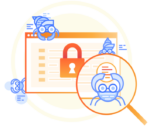ATMs may not be safe ATM
It seems as though there are conferences on just about anything, which means there are speakers with expertise in just about everything as well. Topics such as agile practices, Twitter’s annotations and cloud computing are spoken about frequently, but how about ways to hack into an ATM machine?
At this July’s Black Hat Las Vegas, a computer security conference, security researcher Barnaby Jack plans to deliver a speech entitled “Jackpotting Automated Teller Machines.” He is also set to disclose a new multi-platform ATM rootkit, which according to Wikipedia is “software that is designed to gain administrative-level control over a computer system without being detected.” ATMs now are typically compromised in roundabout ways (i.e. secret cameras to tape someone’s PIN), but Jack’s talk will focus on a more direct way: bugs in an ATM’s software. — Katie Serignese
Hashing out Hadoop
A friend of mine, over burritos, mentioned that he thought the Apache Hadoop project was a piece of junk. He then went on to trash a number of other Apache projects, including the Cassandra NoSQL distributed database.
“So what’s better?” I asked.
“The NoSQL I’m writing,” he replied. This was the expected answer, of course. This particular friend is a super programmer who thinks he can do better than most other developers. He may even be right.
But there’s an awful lot to be said for software that has already been written. Sure, my friend can spend his days working on a from-scratch solution, but people who live in the real world and have to work there don’t have time to write everything from scratch. And frankly, while I agree that some aspects of Hadoop need work, such as the Hadoop File System, the most important thing about the project is not how provably optimum all its functions are, but the fact that it exists at all.
These technologies are still in their infancy and are a vast improvement over the previous situation, in which no solutions existed at all for these new-fangled big data problems. So while my friend works slowly on his NoSQL side project, I’ll take his assessments with a grain of salt. And I’ll be sure to find someone who thinks his work stinks, too, if and when he’s completed it. — Alex Handy
Microsoft comes to terms with jQuery
At first pass, Microsoft’s shift from its AJAX library to jQuery seemed like a prototypical Microsoft move to ditch one existing technology for another. But this in this case, Microsoft has done the right thing for developers.
jQuery is the de facto standard in AJAX development, and Microsoft accepted it instead of continuing to build a competing library. jQuery has become its new baseline. That’s good, because real world development projects use open-source components.
Microsoft’s acceptance of jQuery demonstrates that it is listening to what developers want versus dictating solutions from the top down. — David Worthington
And the Facebook cried out, ‘No hiding place’
Much ado is being made over yet another round of Facebook privacy tinkering. I’m not sure what the problem is, since the site’s founder has all but come out against the notion of privacy itself.
Liz Gannes, writing for GigaOM, is concerned that Facebook is not doing enough to explain the privacy changes to its users, which is supposedly where the consternation is coming from. It’s a tough task either way, though; there are over a hundred different privacy options to be muddled through, so try explaining that.
Instead of the onus being on Facebook, which has made its intentions quite clear, perhaps the onus is on tech writers and journalists who are still confused (or pretending to be confused?) about social networks and privacy. People like Mark Zuckerberg view privacy as an obstacle, not something to be protected. The press does not do a good job conveying that reality.
Complaining about Facebook’s privacy changes is pointless when its goal is to grow so big, you have no choice but to expose your private data to it. Facebook does not care how many people are turned off by its changes. Maybe journalists should stop pleading with Facebook to be more open about its changes and start being more open about their complacency in dealing with the company. — Adam LoBelia
IBM thinking big
Sometimes, advances in technology get us excited about the wrong thing. I now have an iPhone that can locate a restaurant in the vicinity of where I am at any given moment, and that can tell me when my beloved Mets have scored or been scored upon, and I think, “This is very cool.” But in the grand scheme, is the human experience being advanced by Flash video, GPS and iPhone apps?
The other day, a news release came across my desk that made me think, “Now THIS is what we ought to be using technology for!” IBM has announced it is launching a long-term research effort to bring together data that we can use to improve human health. Initially, the project will focus on childhood obesity, and will look at such factors as agriculture, transportation, city planning, and eating and exercise habits to provide recommendations as to how we can improve our health. According to IBM’s Martin Sepulveda, public health is limited to lifestyle choices we make and the health-care delivery system, because it’s been impossible to understand and quantify how environmental factors impact health. The project hopes to give real-world suggestions, such as locating groceries near public transportation hubs to help people who don’t drive eat healthier foods.
IBM says its expertise in service science, computational modeling, math and large-scale analytics can bring together data that exists and that will be gathered in a way that shows wider connections. To this, I say, “THIS is very cool!” — David Rubinstein





